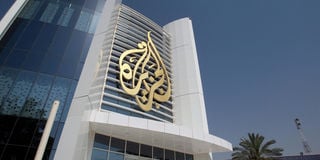Netanyahu pushes to shut Israeli office of Qatar's Al Jazeera TV

The Al Jazeera Media Network logo is seen on its headquarters building in Doha, Qatar June 8, 2017.
Prime Minister Benjamin Netanyahu pledged on Monday to shutter the local office of Qatari satellite television network Al Jazeera while the war in Gaza continues.
Hours after his party spokesperson said parliament would be convened to ratify the necessary law, the Knesset approved the Bill allowing the temporary closure in Israel of foreign broadcasters considered to be a threat to national security.
Al Jazeera, which is funded by the Qatari government, called the Israeli measure an "escalation" and said it "comes as part of a series of systematic Israeli attacks to silence Al Jazeera," according to a statement late on Monday.
The law approved on Monday would allow Netanyahu and the security cabinet to shut the network's offices in Israel for 45 days, which could be renewed, and would stay in force until the end of July or until the end of major military operations in Gaza.
Al Jazeera rejected accusations that it harmed Israel's security as a "dangerous and ridiculous lie" that puts its journalists at risk.
Al Jazeera has been fiercely critical of Israel's military operation in Gaza, from where it has reported around the clock, throughout the war.
Al Jazeera said that Israeli authorities have deliberately targeted and killed several of its journalists including Samer Abu Daqqa and Hamza AlDahdooh, both killed in Gaza during the conflict. Israel has said it does not target journalists.
Communications Minister Shlomo Karai accused Al Jazeera of encouraging hostilities against Israel. "It is impossible to tolerate a media outlet, with press credentials from the government press office and with offices in Israel, acting from within against us, certainly in wartime," he said.
Israeli officials have long complained about Al Jazeera's coverage but stopped short of taking action, mindful of Qatar's bankrolling of Palestinian construction projects in the Gaza Strip - seen by all sides as a means of staving off conflict.
The move to allow the government to close down the local offices of foreign media groups drew concern from the United States, Israel's main ally, which said it was critical to maintain freedom of the press.
"If it is true, a move like this is concerning," White House Press Secretary Karine Jean-Pierre told reporters at a briefing.
Since the Gaza war erupted on Oct. 7 with a Hamas attack on southern Israel that killed 1,200 people and took 253 hostages according to Israeli tallies, Doha has mediated ceasefire negotiations under which Israel recovered some of those taken hostage.
Qatar established Al Jazeera in 1996 and views the network as a way to bolster its profile in the Arab region.
During Israel's military offensive in Gaza, more than 32,000 Palestinians have been killed, including 63 in the past 24 hours, according to the Palestinian health authorities.
However, talks on a second proposed truce appear to be going nowhere. In January, Netanyahu publicly called for the Qataris to be pressed into applying more pressure on Hamas. Qatar hosts the group's political office and several top Hamas officials.
Asked if the threat against Al Jazeera might be part of such pressure, an Israeli government spokesperson, Avi Hyman, did not answer directly, though he did describe the network as "spouting propaganda for many, many years".
DUE PROCESS
In what may have been a hint that Al Jazeera could have legal recourse against any closure, Hyman added during a briefing: "There's due process, so we're not there yet."
Al Jazeera said it reserved the right to "pursue every legal step."
Israel's communications minister accused the network on Oct. 15 of pro-Hamas incitement and exposing Israeli troops to ambushes. Al Jazeera and the Doha government did not respond to those allegations.
The network has subsequently said its employees are "not to engage in any political affiliations that may affect their professionalism" and that all its journalists must adhere to its editorial standards.
In November, Israel appeared to back away from moves to shut the network's offices, instead ordering an end to the local broadcasts of a smaller Lebanese pro-Iranian channel, Al Mayadeen, under emergency media regulations.





